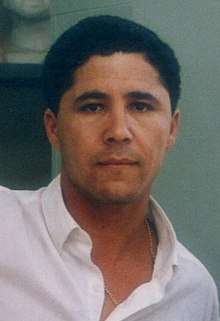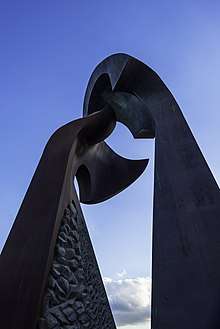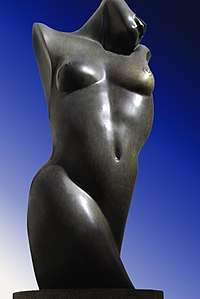Mustafa Arruf
| Mustafa Arruf | |
|---|---|
 | |
| Born |
Mustafa Hamed Moh Arruf 11 June 1958 |
| Nationality | Spanish |
| Education | Melilla, Granada |
| Known for | Sculpture |
| Notable work |
Meetings Torso |
| Movement | Bronze Sculpture, Abstract expressionism |
| Website | https://www.facebook.com/Mustafa-Arruf-Escultor-807290456054783/ |
Mustafa Hamed Moh Arruf (Melilla, 8 June 1958) is a Spanish sculptor.
Biography
Mustafa Hamed Moh Arruf, born in Melilla (Spanish city located in North Africa), in 1958. He began his artistic studies at the School of Applied Arts and Artistic Trades in his hometown and continued his training in Fine Arts in the city of Granada (Spain). His early vocation is painting and sculpture and, although he has worked with materials such as wood, stone (in Holland) and bronze, it is with this material that he best expresses his art.[1]
In the mid-eighties, he moved to Germany, where he performed various works presented at the House of Spain in Frankfurt. After a brief residency in Holland, he moved to Madrid, in the nineties, an artistically very productive period, and worked with the MAGISA Bronze Foundry and the Art Gallery Series. Later he works in the public program of Taller Schools and Oficio Houses, where he performs different teaching tasks, until he obtains a position as a restorer in the Archaeological Museum of the city of Melilla.
As the whole of his work, his urban sculpture —which is exhibited in squares, streets, avenues, parks and gardens of different countries— and public —which is exhibited in centers of different administrations— presents an important diversity, in which Artistic (ornamental) elements are combined with expressive (conceptual) elements.

A group of his works —promoted by public or private institutions, and made from his beginnings as a sculptor, in 1985, until today— the form busts or statues of famous people born or linked to his hometown: to teaching (Juan Caro Romero, 1985), to painting (Victorio Manchón, 1994), to the letters and theatrical representation (the playwright Fernando Arrabal, 1994, the poet Miguel Fernández, 1994, and the actor and theater director Antonio César Jiménez Segura, 2007), and architecture (Enrique Nieto, 2008).[2] Another grouping forms more avant-garde sculptures, with strong contrasts in its design: flat/ volume, soft/rough, hard/soft and, above all, diagonal/circular, with quarters of moon that makes his works contain a dynamic balance and tension.
In 1997 he won the contest that the Autonomous City of Melilla had convened for the commemoration of the V Centennial of his Spanish foundation with the work Encuentros, his most monumental and popular sculpture, although not the most successful in the opinion of its creator. A replica of half of it is in the Juan Carlos I Park, in Madrid, at the foot of which there is transcribed a sonnet by Fernando Arrabal.[3]
Another replica of the other half is in the Park of the Three Cultures, in the city of Toledo.[4]
The sculptor —aware that an author should not interpret his work since the composition in the art of occupying the space depends, more than in any other discipline, on the point of view— makes an exception here with limitations:
Encounters means union of cultures, of continents, of people. It is the embrace of continents and cultures. The word "Encuentros" is very significant. This type of sculptures allows many interpretations because the mind is free. I put "Encuentros" as I could have put something else, but philosophy is the union of cultures, of Mother Earth.[5]

In 2002 he developed a group of female sculptures, promoted by the Consejería de Obras Públicas of Melilla, which that year had decided to allocate one percent of the budget in culture for embellishment of the city. These are works with figurative aesthetic ascription, with geometric formulation and predominance in spiral rotation.
Works in Public Areas:
- Ámsterdam (Holland)
- Berlín (Germany)
- Huelva (Spain)
- Madrid (Spain)
- Melilla (Spain)
- Toledo (Spain)
- Torrejón de Ardoz (Madrid) (Spain)
- Tromsø (Norway)
Works[6]

.jpg)
.jpg)
- 1985: Bust devoted to Juan Caro. Public School Juan Caro (Melilla). Materials:Bronze. Height: 1.60 metres.
- 1988: Ambro Bank. Amsterdam (Holland). High relief in stone.
- 1991: Bust devoted to Victorio Manchón. U.N.E.D. (National Distance Education University) Exhibition Hall. Melilla. Materials used: Bronze. Height: 1.67 metres.
- 1992: `Torso´. Melilla. Material: Bronze. Height: 1.70 metres.
- 1993: Monument devoted to Miguel Fernandez (Melilla). Materials used: Bronze. Height: 2.00 metres.
- 1994: Bust devoted to Fernando Arrabal. Materials used: Bronze and weathering steel. Melilla
- 1997: `Torso outside the Park of the Museum of Modern Art in Tromso (Norway). ´. Material used: Bronze. Height: 1.70 metres.
- 1997: Monument named `Encuentro´. Melilla. Materials: Bronze and weathering steel. Height 12 and 10 metres.
- 1997: Monument named `Encuentro´ at the Juan Carlos I Park at the Field of Nations (Campo de las Naciones) (Madrid). Material: Bronze. Height: 12 metres.
- 1997: Bust devoted to General Cabanillas. Material used: Bronze.
- 1998: `Torso´. Torrejon de Ardoz (Madrid). Material used: Bronze. Height: 1.70 metres.
- 1999: Monument `Encuentros´. Location: Melilla. Material used: Weathering steel. Height: 3 metres.
- 2002: Bust devoted to the Lieutenant Legionnaire Aguilar (Melilla). Material: Bronze. Height: 3 metres.
- 2003: Ten sculptures made of bronze located in Paseo Maritimo Francisco Mir Berlanga (Melilla).
- 2007: Monument devoted to the theatre director Cesar Jimenez. Material used: Bronze.
- 2008: Project-Monument devoted to Pablo Ruiz Picasso (Malaga).
- 2009: Monument devoted to Enrique Nieto (Spanish architect) – Melilla.
- 2013: The monument devoted to Pedro de Estopiñan is restored – Melilla.
Exhibitions
- 1997: Melilla´s International Film Week Award. Sculpture `Encuentros´.
- 1997: Collective Exhibition. Art Gallery Serie (Madrid).
- 1997: International Fair of Modern Art (Estampa, Madrid).
- 1997: International Film Week Award. City of Melilla Award. Sculpture `Encuentros´.
- 1998: Collective exhibition named `Fernando Arrabal Espace´. Villa San Carlo Borromeo. Milan. Italy.
- 1999: Collective exhibition with Fernando Arrabal (Valencia, Alicante, Zaragoza, Madrid, Lisboa) with national and foreign artists.[7]
- 1999: Melilla´s Nautical Week Award. Fifth Centenary [V Centenario] Award.
- 2000: Art Gallery Serie. Collective exhibition.
- 2000: Collective exhibition with Fernando Arrabal in Paris at Bayoux Museum with national ant foreign artists.
- 2000: First Melilla's Nautical Week (Semana Nautica Ciudad de Melilla) Award.
- 2004: Collective exhibition Forum 2004 (Barcelona).
- 2006: Diario Sur [Malaga's newspaper] Sculpture Award (Malaga).
- 2006 Melilla Sefarad, Fundación Gaselec, Melilla.[8]
- 2012: Homage to Dounia Oualit. Individual exhibition sponsored by the Honorable City Hall of Rabat and the Foundation C.D.G. (Morocco).[9]
Awards and distinctions
- Second National Prize in the Sculpture Biennial of Castellón (with his work "Mother") (1981).
- The Autonomous City of Melilla dedicates a street (2003).[10]
References
- ↑ Gómez, Pablo (2010). Mustafa Arruf. [on line]: Revista de escultura pública. Septiembre, nº 244. ISSN 1988-5954.
- ↑ "Enrique Nieto regresa a Melilla con una escultura que mira a su obra: Mustafa Arruf recrea al arquitecto de pie, en la Avenida Juan Carlos I, contemplando uno de sus edificios modernistas". Diario Sur. 22 October 2014.
- ↑ Arrabal, Fernando (2017). Hommage à Melilla, à deux pas de l'aéroport Madrid-Barajas. [on line]: La règle du jeu. Août.<//https://laregledujeu.org/arrabal/2017/08/29/8179/hommage-a-melilla-a-deux-pas-de-l-aeroport-madrid-barajas/> [Consulta: 9 de noviembre 2017]. ISBN 978224685437-1.
- ↑ "Toledo será sede del VI Encuentro de casas regionales de Melilla". ABC.es. 2 August 2006.
- ↑ "Mustafa Arruf: «Mucha gente me dice que mi obra es un poco surrealista»". Diario Sur. 19 February 2007.
- ↑ VV.AA. (2009). Catálogo de monumentos, placas, conjuntos ornamentales y heráldica de Melilla. Melilla: Fundación Melilla Ciudad Monumental. Edición en CD-ROM. ISBN 978-84-613-2646-4.
- ↑ Arrabal, Fernando (1999). Visiones de Fernando Arrabal : Museu de la Ciutat de València, del 2 de noviembre al 12 de diciembre de 1999. Valencia: Consorci de Museus de la Comunitat Valenciana. p. 159. ISBN 84-48223063.
- ↑ Gil Ruiz, Severiano (2006). "Melilla-Sefarad: Génesis de una Exposición" (PDF). AKROS. La Revista del Museo (6). ISSN 1579-0959.
- ↑ "Exposition "Dounia OUALIT : Un Hommage"". Fondation CDG. Retrieved 26 November 2017.
- ↑ "La Excma. Asamblea de Melilla, en sesión celebrada el 30 de diciembre de 2003, aprobó el expediente relativo a la denominación del vial de uso público "Escultor Mustafa Arruf" a la calle que, partiendo de la rotonda de la Ctra. Alfonso XIII, discurre entre la antigua Granja Agrícola y las viviendas y colegios allí existentes" (PDF). Boletín Oficial de la Ciudad de Melilla (4054). 23 January 2004. pp. 202–203.
External links
| Wikimedia Commons has media related to Mustafa Arruf. |